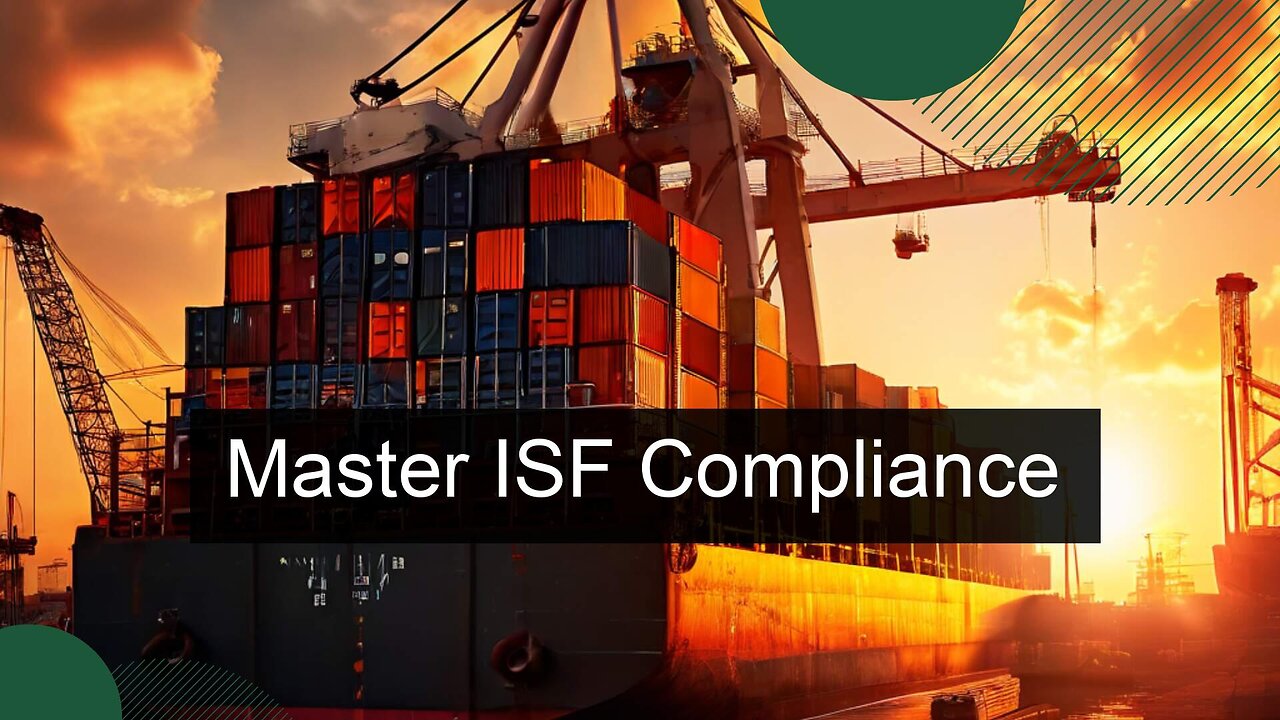Premium Only Content

Title: Mastering Importer Security Filings: A Guide to Compliance and Efficiency
License To Import // 323-578-6432 // file@licensetoimport.com // www.licensetoimport.com
In this video, we discussed the necessary components of an Importer Security Filing (ISF) document. The purpose of an ISF document is to enhance supply chain security and enable the US Customs and Border Protection (CBP) to make informed decisions regarding cargo inspection. We outlined the required data elements, including information about the importer, consignee, seller, buyer, manufacturer, shipping vessel, country of origin, Harmonized System codes, container stuffing location, and consolidator's details. Timeliness is crucial in filing an ISF document, which must be submitted to the CBP no later than 24 hours before cargo is laden onto the vessel. Failure to comply with the ISF requirements may result in penalties, such as liquidated damages, delays, scrutiny, or seizure of shipments. Importers must obtain an ISF bond to ensure compliance and to provide a financial guarantee. Continuous bonds can offer flexibility and convenience for importers filing multiple ISF documents. Working with a licensed customs broker can help navigate the complexities of ISF requirements and ensure compliance.
#usimportbond #isfcustomsbroker #uscustomsclearing #isfentry
Video Disclaimer Here: This video is solely for education and is not endorsed by any US government agency.
00:32 ISF Document Essentials: Understand the key components of an Importer Security Filing (ISF) document, including required data elements, timing and transmission requirements, penalties for non-compliance, and the ISF bond requirement.
1:00 Purpose of ISF Document: Learn how an ISF document enhances supply chain security, aids in risk assessment, and expedites the cargo clearance process by providing critical information to the U.S. Customs and Border Protection (CBP).
1:26 Timeliness and Transmission: Ensure timely submission of the ISF document to the CBP, at least 24 hours before cargo loading, through approved electronic channels like ABI, AMS, or EDI to avoid penalties and delays.
2:17 Role of Customs Broker: Discover the importance of working with a licensed customs broker who can assist in accurately completing and filing the ISF document, navigating customs regulations, and securing an ISF bond for compliance with CBP regulations.
-

BonginoReport
3 hours agoThe FBI's Worst Nightmare CONFIRMED (Ep.145) - 02/21/2025
28.1K31 -
 LIVE
LIVE
Wendy Bell Radio
4 hours agoBatting 1000
10,412 watching -
![CIA EXECUTES LARGEST MASS FIRING IN 50 YEARS - HEGSETH FIRES WOKE GENERAL [EP 4448-8AM]](https://1a-1791.com/video/fwe2/78/s8/1/e/3/n/9/e3n9x.0kob-small-CIA-EXECUTES-LARGEST-MASS-F.jpg) LIVE
LIVE
The Pete Santilli Show
16 hours agoCIA EXECUTES LARGEST MASS FIRING IN 50 YEARS - HEGSETH FIRES WOKE GENERAL [EP 4448-8AM]
1,667 watching -
 LIVE
LIVE
Jeff Ahern
1 hour agoFriday Freak out with Jeff Ahern (Chainsawing DEI)
390 watching -
 46:31
46:31
PMG
12 hours agoHannah Faulkner and Mary Flynn | REVIVING THE AMERICAN DREAM - GROWING UP A FLYNN
2.35K -
 3:01
3:01
Kirill MultitoolOfficial
23 hours ago $5.36 earnedSurvival skills and Bushcraft HACKS in the forest!
30.6K5 -
 11:52
11:52
Dr. Nick Zyrowski
12 hours agoWhat Can I Eat On The Carnivore Diet? | Detailed Guide
30K4 -
 16:23
16:23
TSPLY
20 hours agoNew CNN / MSNBC Meltdown Moments Of Getting Mad At Donald Trump And Elon Musk
21K14 -
 30:54
30:54
Cooking with Gruel
19 hours agoCooking with Matt and Ginger Gaetz
21.2K5 -
 1:22:55
1:22:55
MTNTOUGH Fitness Lab
21 hours agoHomeland Security Pulls Us Off The Plane! Jaw-Dropping Moments from MTNTOUGH's 2024 Ibex Hunt
47.3K1